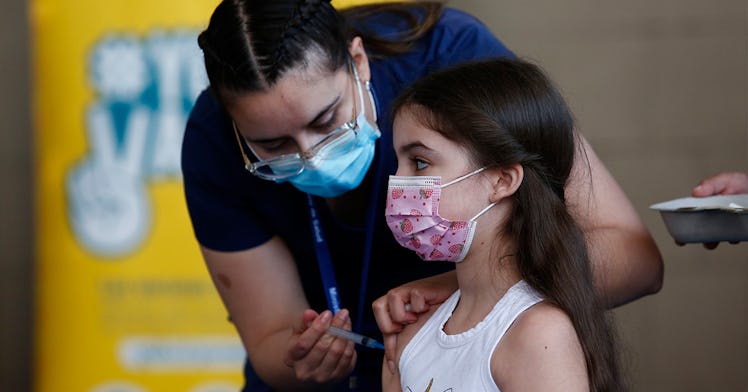The Pfizer Vaccine is Way Less Effective in 5-11 Year Olds. What Does That Mean?
Kids still need to be vaccinated. Here's what to know.

New data out of New York State has found that the Pfizer COVID-19 vaccine for 5-11-year-olds is far less effective at preventing illness in that age group than in kids aged 12-17. .
The data, as reported by The New York Times, followed infection and hospitalization rates of almost 855,000 fully vaccinated kids between 12 and 17, and about 365,000 kids between 5 and 11 from December 13th of last year to January 31st of 2022, notably amid the massive Omicron surge.
It found that in that time period, the vaccine’s efficacy plummeted in both age groups but most precipitously in younger kids. Experts believe vaccine dosage could be to blame.
What the Study Says About Vaccine Efficacy in Kids 5-11
During the Omicron wave, for younger kids, protection against illness dropped from 68 percent efficacy to 11 percent efficacy. In older kids, it dropped from 66 percent to 51 percent efficacy.
The research (which has not yet been peer-reviewed) also found that in younger kids, protection against hospitalization dropped from 100 percent to 48 percent — whereas in older kids, only from 85 to 73 percent.
Fortunately, protection against hospitalization fared better than protection against illness. One expert, Eli Rosenberg from the New York State Department of Health told the Times that the drop was not “entirely surprising, given this is a vaccine developed in response to an earlier variant” rather than Omicron, which did make the vaccine less effective in adults, as well.
Meanwhile, only 1 in 4 kids in that age group have been fully vaccinated against COVID-19 and have not yet been approved for a booster vaccine.
Kids under 5 are still waiting on vaccine approval after Pfizer withdrew its application for kids in that age group due to incomplete data on the efficacy of the vaccines themselves and whether or not the vaccines should be given out in 2 or 3 doses.
What Experts Are Saying About Reduced Efficacy
Because of the stark difference in vaccine efficacy in kids between 11 and 12, s experts think the problem with the vaccine efficacy could be about the dosage itself. Kids 5-11 got 10 micrograms of the vaccine, whereas 12 to 17-year-olds got 30 micrograms of the vaccine.
One virologist, John Moore, speaking to Stat News said “In the study, children aged 12 had the highest vaccine efficacy of all age groups in both cohorts. The striking difference between 11- and 12-year-olds can only be explained by the three-fold dosing reduction in the younger children. The one-year age difference is highly unlikely to make any other factor relevant.”
Unfortunately, there’s no “quick fix” to boosting immunity in kids of that age group. A higher dose, for example, might not be on the table for younger kids, because it could cause too strong of side effects in young kids. Any alternative dosing schemes would need to be studied to see if efficacy could be improved.
What Parents Can Do
Experts still recommend parents vaccinate their kids. As previously mentioned, kids 5-11 are still reasonably protected from hospitalization and severe illness from COVID-19. And while kids are far less likely to get seriously ill from COVID-19, the vaccines will still help kids from spreading the illness to the adults in their lives. They also may help kids shed less of the virus if they do get sick, and they may be sick for a shorter period of time.
And in the meantime, as infection rates remain in a relative lull before whatever variant comes around the bend, Pfizer has the time to figure out how, exactly, they intend to deal with the efficacy of the vaccine in kids aged 5 to 11 and, of course, in kids 6 months to 5 years old.
Pfizer is also clearly still working on how to make the vaccines work for kids aged 6 months to 5 and is looking into whether booster vaccines could be effective in kids 5-11. There are also variant-specific vaccines that are being developed.
What can parents do in the meantime? Wait and watch. The reality is that parents should watch infection rates where they live and, if there’s a dramatic spike, take precaution for their kids. As we all take a breather in this COVID remission, this data is a stark reminder that we’re not all out of the woods yet and that our most vulnerable citizens continue to need our watchful support.